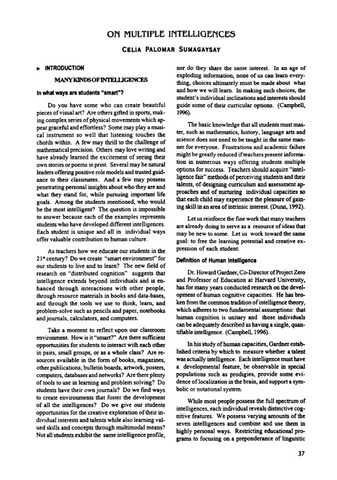On multiple intelligences
| dc.contributor.author | Sumagaysay, Celia P. | |
| dc.date.accessioned | 2023-05-15T01:22:26Z | |
| dc.date.available | 2023-05-15T01:22:26Z | |
| dc.date.issued | 2001 | |
| dc.identifier.uri | https://hdl.handle.net/20.500.12852/2682 | |
| dc.description | Journal article | en_US |
| dc.description.abstract | In what ways are students “smart”? Do you have some who can create beautiful pieces of visual art? Are others gifted in sports, making complex series of physical movements which appear graceful and effortless? Some may play a musical instrument so well that listening touches the chords within. A few may thrill to the challenge of mathematical precision. Others may love writing and have already learned the excitement of seeing their own stories or poems in print. Several may be natural leaders offering positive role models and trusted guidance to their classmates. And a few may possess penetrating personal insights about who they are and what they stand for, while pursuing important life goals. Among the students mentioned, who would be the most intelligent? The question is impossible to answer because each of the examples represents students who have developed different intelligence. Each student is unique and all in individual ways offer valuable contribution to human culture. | en_US |
| dc.language.iso | en | en_US |
| dc.publisher | Central Philippine University | en_US |
| dc.rights | CC0 1.0 Universal | * |
| dc.rights.uri | http://creativecommons.org/publicdomain/zero/1.0/ | * |
| dc.subject.lcsh | Multiple intelligences | en_US |
| dc.title | On multiple intelligences | en_US |
| dc.type | Article | en_US |
| dcterms.accessRights | Publicly accessible | en_US |
| dc.citation.firstpage | 37 | en_US |
| dc.citation.lastpage | 39 | en_US |
| dc.citation.journaltitle | Engineering journal | en_US |
| dc.citation.volume | 4 | en_US |
| dc.citation.issue | 1 | en_US |
Files in this item
This item appears in the following Collection(s)
-
Engineering Journal [23]



